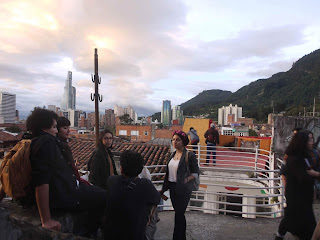 |
Iván Duque, Colombia's
virtual president. |
With 39% of the first-round voting, little short of a huge scandal or a heart attack can stop Ivan Duque from being elected Colombia's next president.
Duque will win, almost certainly, despite his youth and inexperience - he formally entered politics only in 2014 and has held no executive positions - and carries all the baggage of his political patron, ex-president Alvaro Uribe, whose political career has been scarred by severe human rights violations and who has been credibly linked to right-wing paramilitary groups. Just a few days ago, the New York Times reported that during the 1980s investigators collected evidence that Uribe's campaigns were financed by drug cartel money.
It didn't have to be this way. If only at least two of the centrist candidates, such as Sergio Fajardo and Humberto De La Calle had formed an alliance, the political center might have gained enough critical mass to give voters confidence that at least one centrist candidate had a chance. Instead, with the center fragmented amongst three candidates, voters polarized to the two candidates who seemed viable: Duque on the right and ex-guerrilla leader and Bogotá Mayor Gustavo Petro on the left.
As it was, ex-Medellin mayor Sergio Fajardo fell just over one percentage point behind Petro. With the support of De La Calle and the Liberal Party, he likely would have made the second round run-off, where he could have attracted both centrist and left-wing voters and realistically beaten Duque.
Instead, Duque will draw draw the lion's share of Germán Vargas Lleras' voters and many of Fajardo's, easily giving him the additional 11% support he needs to become president.
Duque was a leader of the 'No' campaign against the peace accord with the FARC guerrillas, so we can expect a President Duque to do all he can to sabotage it. And two of his key constituencies were conservative Catholics and evangelical Christans, so we can also expect him to try to reverse gains made for the rights of women, sexual minorities and Colombia's environment. Duque will instead favor big business and resource extraction.
This will test the principles and resilience of Colombia's judicial system.
Where's the hope? Duque is highly educated and evidently very intelligent. He's got lots of academic preparation, from Los Andes University and Georgetown and Harvard in the United States.
Perhaps Duque will turn out to be his own man, rather than Uribe's, as Duque has repeatedly promised. It's not impossible. After all, Uribe also chose Juan Manuel Santos, his defense minister, to be his successor, but Santos set his own course by talking peace with the FARC guerrillas and became Uribe's political enemy.
By the same token, Ecuadorean president and strongman Raphael Correa chose his vice president, Lenin Moreno, to succeed himself. But Moreno broke with the leftist Correa and the two have also become political enemies.
However, Santos had a long political trajectory and came from a family which had already produced several presidents and vice presidents, so he had the confidence and political base to hew his own path. Duque is still a neophyte.
As for second-place finisher Gustavo Petro, who will run-off against Duque, he has little chance. Petro received 25% of the vote, meaning that he would need all of Fajardo's votes and more to win a majority. And, if Duque is a polarizing figure, ex-guerrilla leader Petro is even moreso.
That said, it is remarkable that a nation which has for decades battled against guerrilla groups would even be willing to put an ex-leader of such a group one voting round away from its presidency. It deprives the FARC guerrillas of any arguments that they have been treated unfairly by the political system.
By Mike Ceaser, of
Bogotá Bike Tours























































